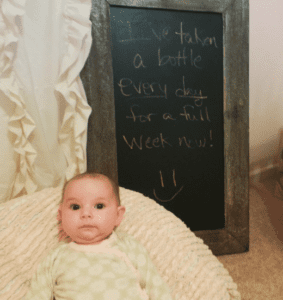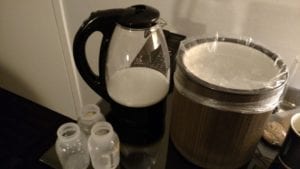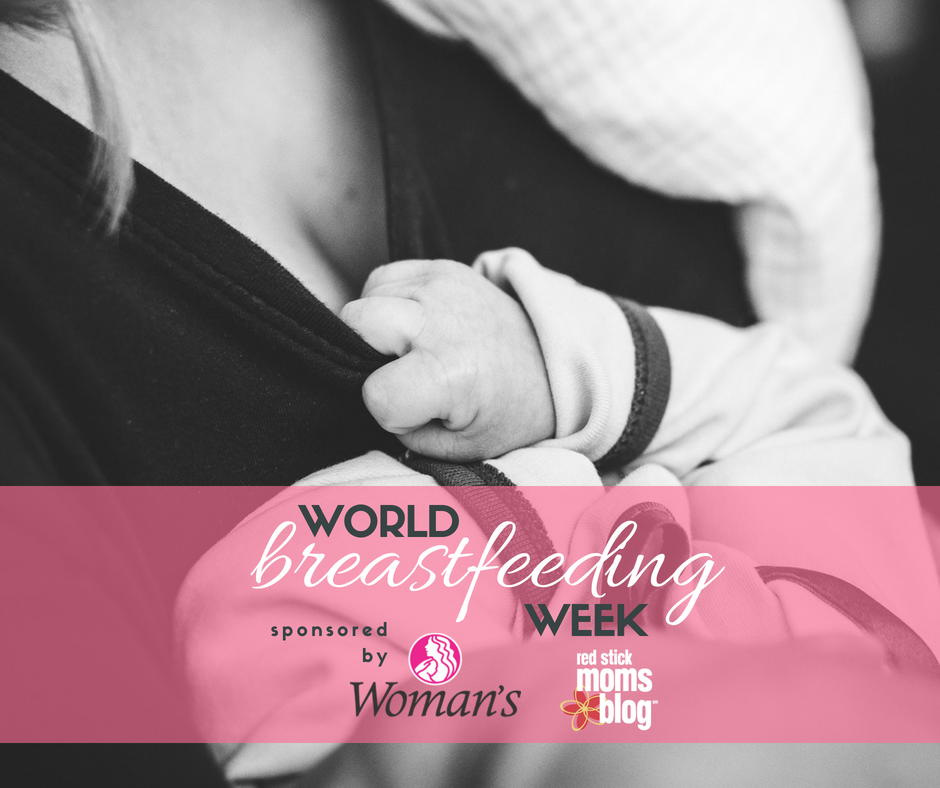Disclosure: This post is part our series in observance of World Breastfeeding Week and is sponsored by Woman’s Hospital.
High Lipase and Bottle Refusal: The Part of Breastfeeding and Pumping No One Told Me About
When I was pregnant with my first baby, Lillian, I intended to breastfeed from the get go. Like many new moms, I wanted to do everything “right” (spoiler alert: there is no one set “right” way to do things when it comes to raising children), so I read as much as I could get my hands on in relation to breastfeeding and joined a breastfeeding support group on Facebook ahead of time.
One of the things that I kept reading over and over again and hearing in the group was the importance of not offering a bottle too early because of the chances of “nipple confusion.” So I didn’t. I didn’t offer her a pacifier for a few weeks and didn’t try offering her a bottle until she was about four weeks old.
To say it didn’t go great would be an understatement.

As the time drew near for me to go back to work, my stress and anxiety went way up each time I offered her a bottle only for her to refuse it. If you can think of a solution, I can assure you we tried it. We tried multiple types of bottles, bottle nipples, tried offering the pumped milk at different temperatures. I had my husband offer a bottle since I thought maybe she wasn’t taking it because she knew I had the real thing. I left the house to go to the grocery store and left her with my mom and a bottle. She cried the entire time. No luck.
The day finally came when I had to go back to work, and I tearfully dropped her off at a friend’s house and made my way to work. I was lucky enough to pump plenty of milk, but she refused every bottle offered to her. My friend resorted to giving her some of my milk through a syringe but it was a battle daily that left both of them in tears on the couch.
The problem had been right there all along.
After work one day, as I nursed my {very hungry} baby, my friend and I discussed what our options were at this point. She would not take anything from my friend in a bottle. Almost all of my milk was going into the freezer instead of my baby’s belly. I mentioned that I had read something about high lipase and wondered aloud if maybe that was the problem since I had no idea what else it could be.
“Well … I’ve always thought your milk smells exactly like Ivory soap.”
I knew that was it. It had to be – milk that smelled or tasted like soap was supposedly high lipase. The only way to know was a taste test.
Tasting your own milk is something probably every breastfeeding mom has done at some point but it was definitely strange for me. I tasted some of my own milk, fresh, and then some of my milk from the fridge. Fresh milk has a very sweet taste. The milk from the day before – still “fresh” – was so metallic and bitter tasting that I gagged. And then, because we are talking about post-partum hormones here, I cried that I was dropping off my baby every day with nasty-tasting milk! I couldn’t even make milk right, for Pete’s sake!
The solution was the biggest pain in the butt ever.
I knew that there were ways around lipase – some moms with high lipase milk are able to use their milk fresh for a few days before it “turns.” The breastfeeding support group recommended doing a taste test daily to see how long your milk still tastes okay before the metallic taste overwhelms the milk. Mine would not last overnight. Which meant that the only thing I could do was to take care of the issue immediately.
The solution to high lipase is to essentially pasteurize your own milk – you have to scald it (not boil it) on the stove, and then immediately cool it down. This meant, that in addition to the headache that is pumping, and washing pump parts, when I got home from work, I had to immediately go to the stove, and scald my milk. There were days that I forgot to do it immediately and when I remembered, the milk already had a “yuck” smell to it. I could not bring myself to pour it down the drain because it literally hurt my heart thinking of all that hard work pumping to pour out the liquid gold, so I would ask my husband to do it.
Because she had refused a bottle for so long, I had been putting almost all of my milk in the freezer – I had a freezer stash of about 84 ounces that were just going to be a complete loss. I donated the stash of milk and tried to feel better about it because someone’s baby was going to get all my hard-earned milk, but I still was sad my own baby wouldn’t or couldn’t use it.
The Acceptance Part of All of It


Ultimately, I had to just accept that this was our new reality. I could scald my milk and it could taste like it was supposed to taste and the baby would be more likely to take it (she was never *great* at taking a bottle – now I know that was her strong will just showing up early!). Was it a huge pain? Absolutely. Was it worth it? For me, it was because it meant I could keep nursing her.
When she was ten months old, my husband and I went on our first overnight stay without her. I knew that I had to still pump, but I refused to dump that milk down the drain. I ended up making do in our hotel room with an electric kettle and the hotel ice bucket. It occurred to me that this might have been extreme, but “pump and dump” were just never a part of my vocabulary while I was breastfeeding.


Fast forward a couple of years … when I had my second baby, I knew my milk was likely to be high lipase and started out scalding it from the beginning. It turned out that was totally unnecessary! Judah was a super-chill baby who was okay with funny tasting milk. I cannot tell you how big of a relief it was to just come home after work and put my milk straight in the fridge.
For the nursing and pumping mamas out there:
If your baby is refusing a bottle, I would highly suggest reading this article on KellyMom about high lipase and doing a taste test! Scalding my milk worked for us, and it ultimately helped us to meet our goal of one year of nursing. While I hope no pumping mom reading this has to go to these measures, if you do, just know that you are not alone, and I’m over here cheering for you! Good luck!




















